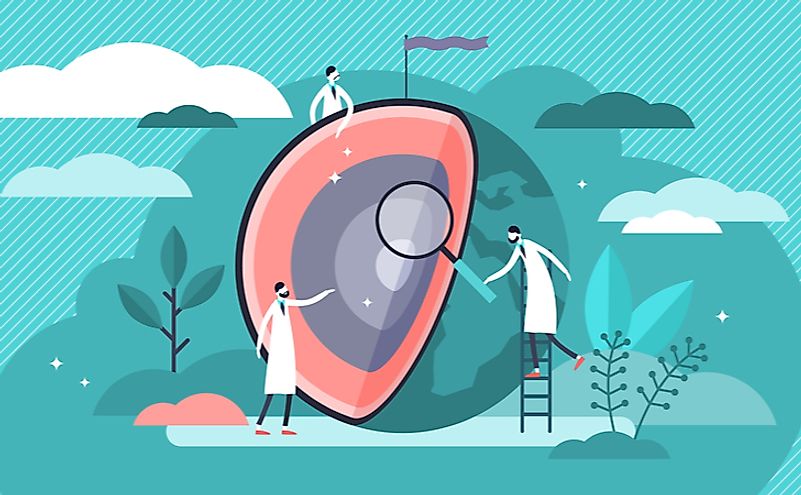What Is The Difference Between Geology And Geography?

Most people confuse geology for geography and often think that the former is part of the latter. This common confusion arises because the two areas of study involve the Earth. However, the truth is that geology is not geography, but these two fields have some similarities and connections. The word geography is derived from the Greek word geographia, which translates to "Earth description." Geology, on the other hand, is also derived from the ancient Greek language. The word Geo means the Earth and -logia means "the study of." It is believed that the first person to use the word geography was Eratosthenes, who is the founder of the scientific chronology (276 BC-194 BC). Theophrastus (372 BC–287 BC), who succeeded Aristotle in the Peripatetic School, wrote about stones or "Peri Lithon," which is believed to be the earliest work on geology.
What Is Geology?
Geology is the study of the Earth's history, its composition, and Earth's processes, including its future. It is Earth Science which specializes in the solid part of the Earth such as rocks, their composition, and the processes that have affected them over time. Geology includes the study of terrestrial planets and other natural satellites such as the moon. The study of geology also overlaps other areas of Earth Sciences such as atmospheric sciences and hydrology, and therefore it is regarded as one of the main aspects of planetary science and earth science. Integral areas of geology seek to understand the structure of the Earth and anything beneath the surface, including the processes that shaped these structures. Geology also provides tools to establish the absolute and relative ages of rocks found in a given area and describes their histories. Through the combination of these tools, a geologist can give the chronology of the Earth's history as well as demonstrate the Earth's age. Geology gives the main evidence of the past climate on Earth, the history of the Earth, the evolution of life, and plate tectonics.
What Is Geography?
Geography is the study of the physical properties on the surface of the Earth and the interactions between the environment and people. Geography examines the human culture and its relationship with the natural environment as well as how places and locations could have an impact on human societies. Geography attempts to understand why things are found where they are, and how they change or develop over time. It incorporates aspects of culture, people, settlements, landforms, and politics, etc. A geographer asks a special question on how and why things are around or distributed in a certain way on the surface of the Earth. It examines these arrangements and distributions on many different scales and asks questions on how interactions of different natural and human activities on the surface of the Earth help to shape the characteristics of the world in which we live. A geographer would want to understand where things are located and why they are found in those locations; how things in distant places influence each other over time, and why people who live in certain locations and places have impacted their surroundings in a particular way.
Branches Of Geology
Geology like any other field of study has several branches which include biogeology, economic geology, engineering geology, geomorphology, environmental geology, geologic modeling, geochemistry, geophysics, hydrogeology, historical geology, marine geology, mineralogy, and volcanology. Other branches of geology include structural geology, petrology, petroleum geology, paleontology, mining geology, sedimentology, and stratigraphy. Although geology is the study of the Earth's subsurface, the discipline also studies the structures of other planetary bodies, which is another branch of geology known as planetary geology.
Branches Of Geography
Geography is divided into two broad categories of human geography and physical geography. Human geography is also known as Anthropogeography, and it studies human societies, economies, cultures, and their relationship with the environment. It looks at human patterns, dispersion, level of interrelationships, and how they affect or influence the environment. This is generally about the study of human activities using quantitative and qualitative research techniques. Physical geography or physiography is the branch of geography that studies the patterns and processes in a natural environment such as the geosphere, biosphere, hydrosphere, and atmosphere. Besides these two broad categories of geography, there are other categories which include geomatics, integrated geography, and regional geography among several other branches.
Methods Of Geology
Geologist uses different types of numerical modeling, laboratory, and field methods to try and understand the different processes taking place below the Earth's surface. In a geological investigation, a geologist would use information relating to petrology, which is the study of rocks, stratigraphy, which is the study of sedimentary layers, and structural geology, which is the study of rocks position and the deformation. In many instances, a geologist would study modern rivers, soils, glaciers, and landscapes to understand the past and the present biochemical and life pathways, and would typically use geophysical methods in investigating the subsurface of the Earth.
Techniques Used In Geography
Maps have been the key tool in geography. Cartography, which has been a classical tool in geography, has now received modern approaches through the use of computer-based geographical information systems (GIS), geographical analysis, remote sensing, Qualitative and quantitative techniques among many others.
Importance Of Geography And Geology
Geography and geology give us the understanding of the substances on Earth, the structure, history, and the processes acting on our planet. Human beings rely entirely on the resources found on the Earth's surface and below it. It helps us to understand how to interact and utilize the resources found on our planet as well as how to care for our world, the flora, and the fauna. It also helps humanity to understand natural phenomena such as volcanic eruptions, earthquakes, hurricanes, etc. so that they can protect themselves from any such events in the future.











